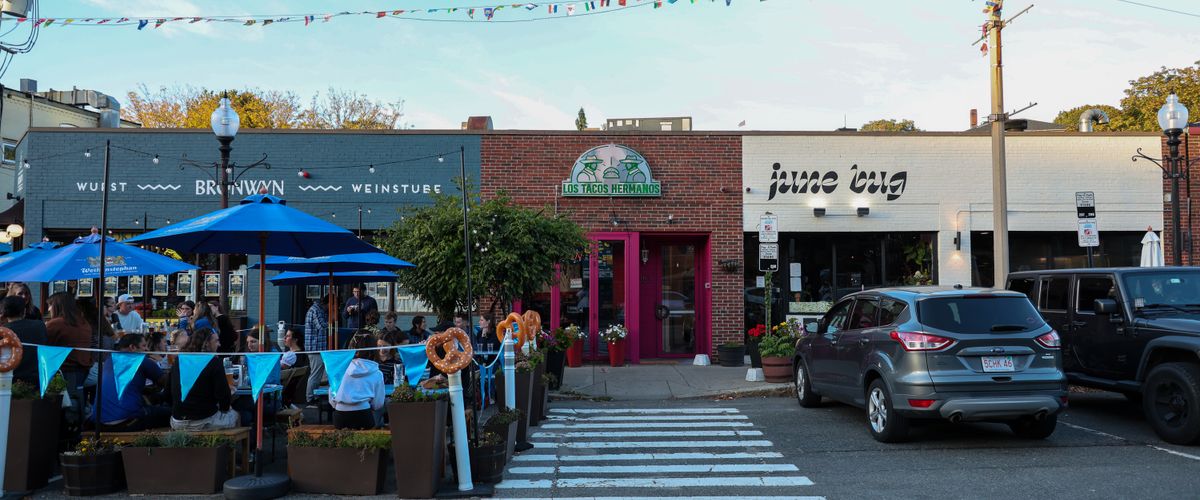GUDL is launching a special, time-limited pilot program to support the development of partnerships addressing gentrification and displacement in Massachusetts.
We invite local organizations and individuals to submit requests for collaboration for a chance to receive seed funding in early 2026.
This pilot aims to foster new, cross-sector partnerships that bridge local knowledge, research, and policy to develop practical, community-driven solutions. Applicants could request to partner with, for example, advocates working on anti-displacement strategies, policymakers implementing anti-displacement policies, or researchers to conduct data analysis or to establish research-practice partnerships.
Please get in touch with IOC Executive Director Stacy Fox at sfox@bu.edu if you have any questions.
Request for CollaborationKey details
- Focus: Collaborative work to prevent gentrification-induced displacement in Massachusetts
- Funding: Seed grants between $5,000 to $15,000 to support selected collaborations
- Eligibility: Massachusetts-based collaborators, including community organizations, policy practitioners, and university-affiliated researchers
- Timeline:
- Call Opens: Wednesday, October 29, 2025
- Stage 1 – Request for Collaboration (Priority Deadline): Submit by Sunday, November 16, 2025. Submissions received by this date will receive priority consideration for funding. Proposals will continue to be accepted on a rolling basis thereafter, as capacity and funding allow.
- Stage 2 – Request for Seed Funding: Selected partnerships will be notified in December and invited to submit funding requests
- Award announcements: January-February 2026
How it works
- Submit a preliminary interest form. This will include a description of how gentrification and displacement are related to your work or the work of your organization, and the types of collaborations you are interested in. Examples of collaboration may include sharing best practices or strategies from stakeholders in different contexts, requests for analysis of data, research-practice partnerships, and more. At this initial stage, the focus is on helping you identify potential collaborator(s); applicants do not need to provide information about expected costs associated with the collaboration.
- Partner matching. The GUDL team will review submissions and identify potential partners from our network —including organizations, policymakers, advocates, practitioners, and researchers —whose interests align with your proposal.
- Collaborate and apply for funding. Once introductions are made, collaborators can jointly develop a brief proposal for seed funding ($5,000 – $15,000). GUDL may assist in aligning goals and refining proposals.
- Grant period and reporting. Funded collaborations will receive awards according to agreed-upon grant terms. At the end of the project, partners will submit a brief report summarizing outcomes and lessons learned. For partnerships seeking to continue or expand their work, GUDL can provide support in drafting and submitting applications for larger, external grants.
Eligible Expenses
Seed funds can be used for collaboration-related costs, including:
- Compensation for time spent collecting or analyzing data, synthesizing best practices, and conducting policy analysis. Note: We expect budgets to reflect the shared contributions of partners. University-affiliated researchers may request limited support for their time (up to 20% of the total budget), with the remaining funds directed toward collaboration and partner activities.
- Expenses related to data collection or the purchase of datasets
- Meeting-related expenses, such as materials, space, or refreshments, for gatherings that bring together stakeholders to share best practices and learn from one another
- Travel necessary for collaboration across regions or organizations
- Other materials or supplies needed to carry out collaborative activities
This opportunity is designed to spark new partnerships and pilot creative approaches to mitigating displacement in Massachusetts communities – combining the strengths of research, practice, and lived experience to inform more equitable urban policy and development.
Ready to Collaborate?
Submit the Request for Collaboration below by the priority deadline of Sunday, November 16, 2025.
